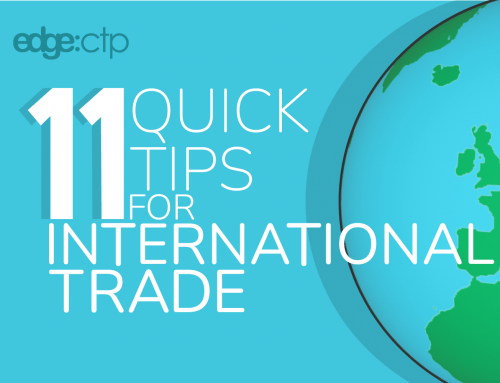Exporting and Deliver Goods and services Overseas:
This is the process of delivering goods and services internationally.
Ask An Expert
Discussion with renowned global trade expert Murdo Beaton and Abdul Mann, creator of the cloud-based export solution EdgeCTP.
Geoff:
Today I’d like to ask, what is the process for delivering goods + services overseas and in particular how to deliver physical goods overseas in the best way possible?
Murdo:
The physical exercise of moving products from A to B in the global market does entail certain procedures that we have to deal with. Let’s start with the easier of the two, which is the delivery of services.
Delivery of Services is a different exercise because there is no physical ‘object’ (as such) that needs delivery of the service, which to a greater degree make service an intangible entity, but that doesn’t deny the fact that service is still required to be delivered either in person or digitally via online meeting places (e.g. web conference etc.). Normally, we find that service delivery is when the service is actually consumed by the party who has requested it. On the consumption of that service, one would say that the service has now been delivered. Hence, the process for delivering services is something like this:
- Arrange what service the receiver/customer would like to receive and that you can provide
- Arrange when the service can be delivered at that suitable time for all concerned parties
- Arrange where the service will be delivered; suitable to both the receiver and provider (you). This could be either:
- The customer’s premises (i.e. overseas), which would mean you will need to arrange personnel + equipment travel (i.e. consultant(s)/trainer(s) + country entry visa requirements + travel + accommodation + ATA Carnets for any equipment used for the delivery of the service etc.)
- Your premises i.e. where the customer comes to see you in your country and/or premises, in which case you will need to arrange consultation meeting or training/service delivery room(s) facilities
- Online via webinars; meetings places or VOIP (voice of internet protocol) tools etc. if your service is the delivery of a digital asset of some type, such as software or training material in a digital form or consultancy outcome reports, accountancy services etc., then where will this material be delivered, needs to be agreed e.g. cloud storage; email etc.
Basically, for services, the consumption of the service is synonymous with the delivery of it.
Delivery of Physical goods is for tangible products, this is more of a physical exercise where goods have to move through different transport modes. The process for delivering physical goods overseas is basically the goods having to:
- Go from the exporter’s premises to the port or airport of exit
- Travel to the main entry port or the main airport in the market of destination
- Travel from that entry point to the premises of the buyer or the intermediary that we have included in our business model
Now, we also have to be aware of the fact that when we move goods in the physical mode from A to B, we do so under what’s called Contract of Carriage. These are contracts that we entered into with the carrier, if we, the exporter, are responsible for the delivery of the goods. Put another way, we have to make sure when we are exporting the goods that we also have the proper Contract of Carriage in place with the carrier, who are taking the goods from our own market to the destination market.
Export Declarations: We also have to make sure that on leaving the UK market, the UK shores, and the UK exit point, that the goods are declared to our own Customs Authorities. Now, this is for no major reason other than that, for most cases anyway, 90% of cases, it’s purely for statistical purposes. We are just simply recording that these goods are leaving the UK to go to a foreign market. There are some instances where we might be exporting goods in which, Customs might have a particular interest because they are under some form of regulatory control and Customs have to make sure they approve/aware of the export of the goods.
Import Customs Controls: Where on the goods arriving in the destination market, the goods have to go through the process of being approved by the Customs Authority of the receiving market. After being approved and released by that authority, and on the payment of any duty or taxes, then the goods would be free to be delivered to the actual customer.
Abdul:
This touches upon one thing that they call Delivery Terms or Incoterms, and these are things that you would agree upon up front with your buyer. I’d assume at the quotation stage or when they’re agreeing to the delivery of the goods and so forth. Could we touch upon what an Incoterm is and how it’s important in the whole scheme of things, especially on the delivery of goods?
Murdo:
Yes, International Commercial Terms or more commonly called Incoterms, are fundamental to every international transaction where a physical product is involved. The Incoterm determines exactly the responsibility of both the buyer and the supplier, i.e. the exporter and the buyer. There are a number of Incoterms that can be used in international trading, and the Incoterm selected will determine who plays (and pays for) what part in the physical logistics of the transportation and who is responsible for producing what documents. That is, each Incoterm lays out exactly where there is a responsibility for the exporter to pay up to, and where there is a responsibility for the buyer to pay from.
Now when we talk about delivery of the goods, we know it is a single delivery channel from A to B, but the buyer and seller can meet somewhere within that channel and exchange responsibilities. Such as the buyer could take over the responsibility of the goods while they are still in transit, and the exporter will surrender any interest in the goods, even before they are actually delivered to the buyer’s premises.
The selected Incoterm will determine this switch-point of responsibilities, so yes of course, for the purpose of delivering the goods, Incoterms do play a very, very major role.
Geoff:
I hope you enjoyed this. If you’d like more information on international trade, go to www.edgectp.com.






